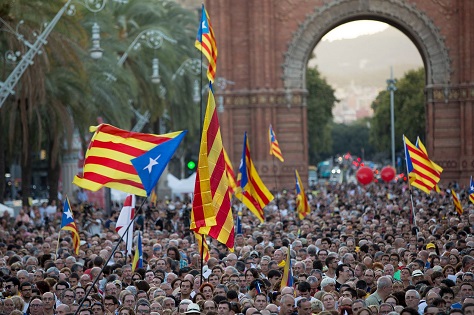If September 2014 was the month when Scottish independence made global headlines, it might be September 2015 when Catalan independence has its breakthrough — at least if regional president Artur Mas has his way. ![]()
![]()
Barely 10 months after Catalonia’s regional government held a non-binding referendum on independence, and just three months before the Spanish general election, Catalan voters will elect a new regional parliament in a campaign that Mas has been waging for months as a de facto referendum on the region’s future status within — or outside of — Spain.
Mas, the presidential candidate of the cross-ideological Junts pel Sí (Together for Yes) coalition, argues that a victory for the pro-independence forces will give him the leverage he needs to demand negotiations with Spain’s central government. Spain’s conservative prime minister Mariano Rajoy, however, has steadfastly refused to discuss autonomy with Mas, let alone an independence referendum. Rajoy contends that any independence process is illegal, and Spain’s constitutional court ruled that last year’s November referendum was illegal. Though Mas backed down and canceled the vote, he nevertheless provoked Madrid by holding a non-binding plebiscite to flex the muscles of the Catalan independence movement. In turn, Rajoy’s refusal to discuss the matter or even permit an in-out referendum has alienated Catalan voters who might not otherwise be enthusiastic about independence.
* * * * *
RELATED: Can Felipe VI do for federalism
what Juan Carlos did for democracy?
* * * * *
At face value, Catalans are merely going to the polls on September 27 to elect the 135 members of the regional parliament. But after the Greek eurozone showdown earlier the summer threatened the eurozone’s stability and split Europe’s north and south, and even as the ongoing refugee crisis is threatening the integrity of the borders-free Schengen zone, splitting Europe’s west and east, the cause of Catalan independence could become the European Union’s next fashionable crisis.
Mas promises that if the Catalan electorate gives Junts pel Sí a majority in the Catalan parliament, however narrow, it will be sufficient to launch an 18-month process that will result in the region’s independence and promulgate a new Catalan constitution.
So what exactly is happening in Catalonia? And what should we expect the day after regional elections? Continue reading What’s at stake in this weekend’s Catalan regional elections
